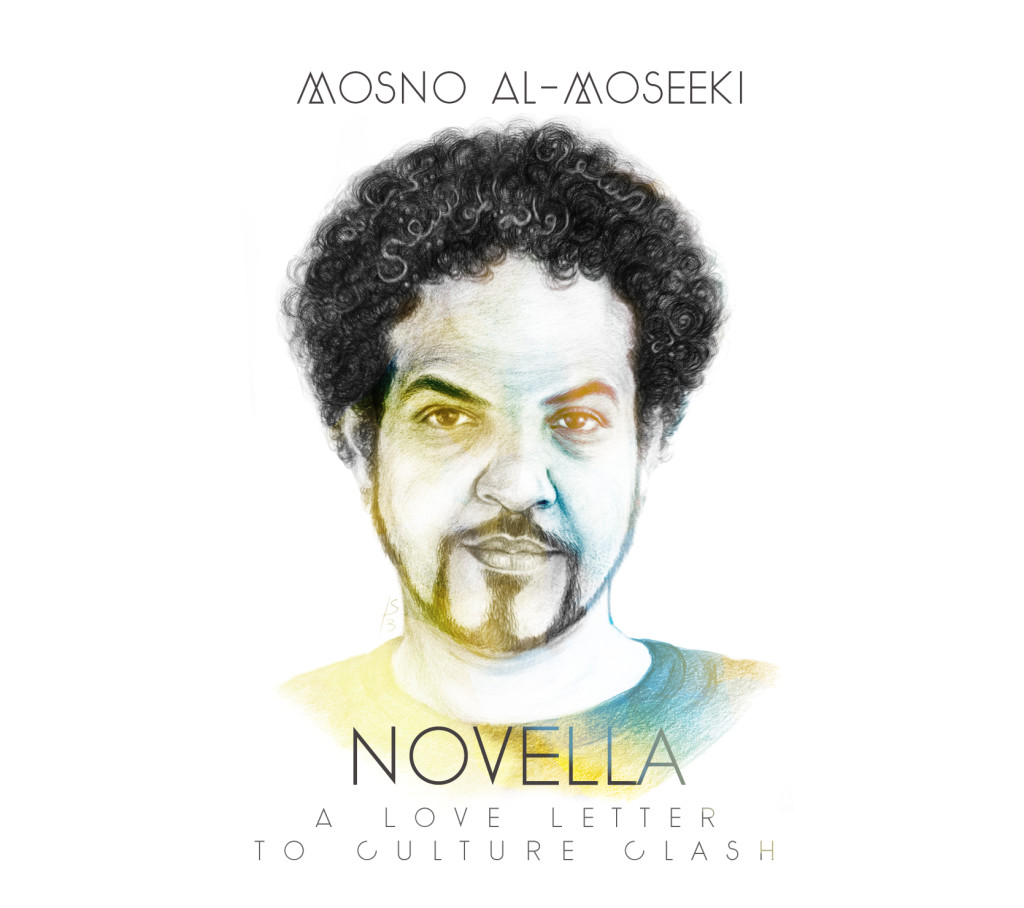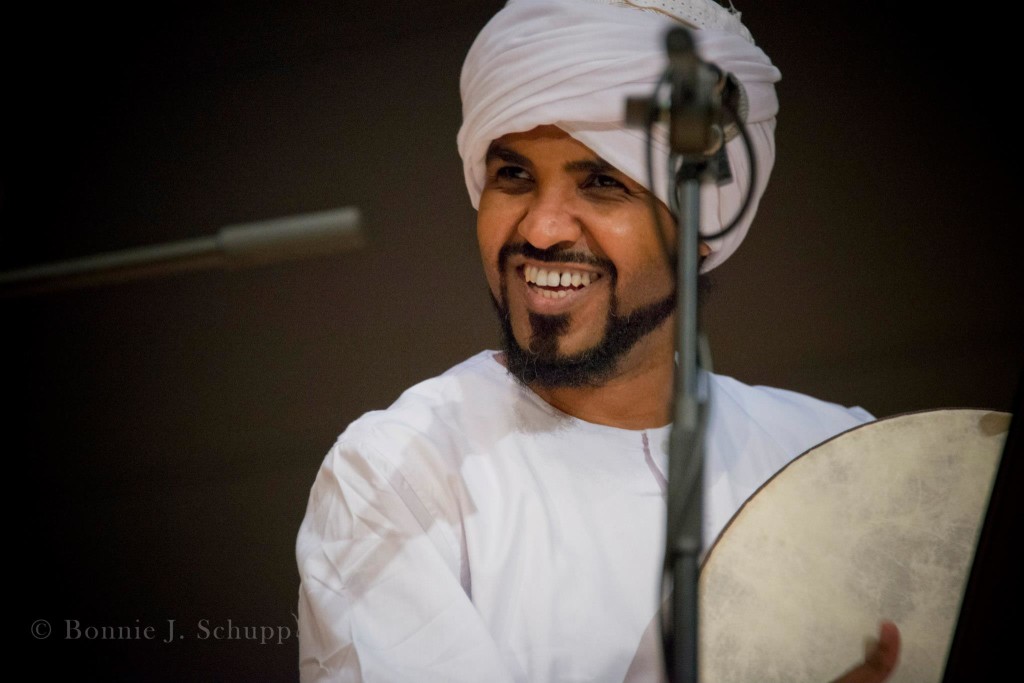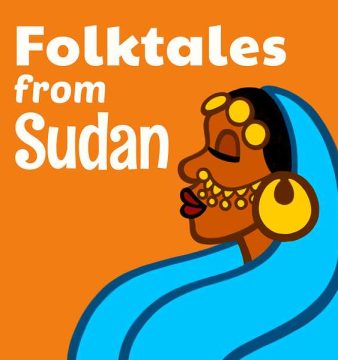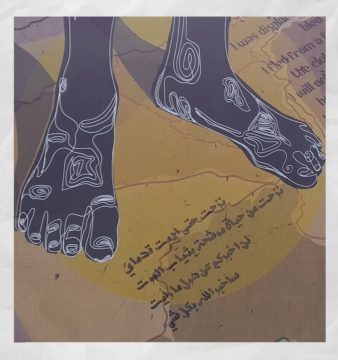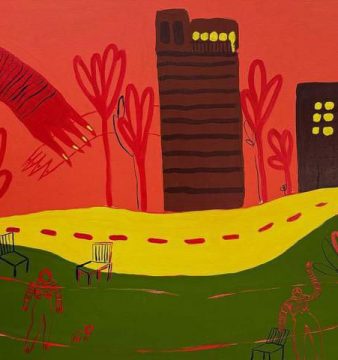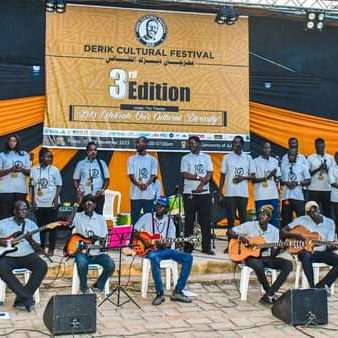On Mosno Al-Moseeki’s Fairy tale Novella
Hearing about Sudanese artists producing well received projects is something we enjoy and take pride in. So when 500 Words Magazine was approached to review Mosno Al-Moseeki’s latest concept album “Novella: a Love Letter to Culture Clash” we were thrilled. We had the joyful opportunity of listening to the full 24-track album and interviewing Mosno on his semi biographical album. Mosno is an international singer/songwriter from Sudan, now residing in Baltimore, USA. Mosno’s “System Down (#SudanRevolts)” was a huge hit in the summer of 2012 and earned his website a foreseeable ban in Sudan.
Mosno’s career is studded with numerous collaborations with international artists such as Central African Republic born and Baltimore based DJ N’dinga Gaba and openings for famed artists such as Grammy nominated artist Mathew Santos and the Rusted Root band. His song “No Kingdom” was featured in the Sudanese-American short film “Faisal Goes West” which premiered in various international festivals and was shown in the first Sudan Independent Film Festival in early 2014.
“Novella” is an invigorating listen; the tunes are heavily influenced by Afro-Nubian pentatonic music and Arabic poetry. The rhythmical blend of storytelling, whimsical vocals and instrumental infusions make the album an exciting experience for the cultural traveler in all of us. “Novella” has the soothing effect of harmonizing a cultural journey and fueling wanderlust at the same time. Mosno will perform the album release at the Teavolve Café with his side project The Greek Nubian Collective in Baltimore on May 31st. You can download the entire digital copy here (closed until the album release). Stay up to date with Mosno’s tunes and gigs by following him on Soundcloud and Twitter.
***
500 Words Magazine: You coined the term “Desert Eclectic” to classify your music; what inspired this description and why did you choose the desert and not another landscape- say the Nile or Nuba Mountains?
Mosno Al-Moseeki: I personally love the desert, I always have. To me deserts are beautiful, mystical and calming. Also, when I grew up in Sudan as a child, there was a desert next to our little town in Imtidad. So it’s something that I saw and enjoyed every day. Plus, there is also a wonderful Sudanese artist who goes by “Nile”, so that was taken! Hopefully this way we take the musical world by land and sea.
500: Your lyrics are beautiful poetic descriptions of difficult journeys and soul replenishment, what were some of your toughest journey memories and sources of reassurances?
Mosno: Thank you for your lovely compliment, I’m glad you enjoyed the lyrics. One of my toughest physical journeys was when I went to Egypt; that was a learning experience for me. I literally couldn’t leave the country, and was stuck there for 6 years. I was in my teens, and was treated as a second class citizen. Poetry and music kept me sane. I listened to almost anything with a good rhythm, and when I stumbled upon an album called “These Days” by Bon Jovi (also later on came across U2, which is my favorite band on this planet) it opened my eyes to poetic songwriting, so I would listen and write almost every day after school. It helped me escape the reality I was in, until I was able to return to the United States. The more I learn about the complexity of the English language, the more elaborate my lyrics become.
500: What’s the significance of poetry in a musical album?
Mosno: I believe that poetry is very significant; the best songs are the ones that are beautifully written. If you look into our beautiful Sudanese culture, many of the songs are actually poems with musical accompaniment. It’s brilliant, and I believe it influenced the way I write. To me, the choice of words is important; people will receive or not receive a message based on how you say it.
500: “Novella” is a fairy tale with a cast and story. Your inspiration was your migration from Sudan to Baltimore, but how did the rest of the cast relate to the journey and what additions from their own journeys did they add to your tale?
Mosno: The main story of “Novella” is based on my migration as you mentioned, but the core story is about finding oneself. It’s of recognizing “where you are” versus “where you belong” and deciding to go on the journey. That’s how the talented cast related to the story. Most of the musicians are actual immigrants like me and found refuge here in the East Coast of the USA. Some are from Greece, Sri Lanka, Ethiopia, and Palestine just to name a few. Even my American musical partner Sahffi Lynne, had her own journey through music; going from a classical French Horn player to an indie Neo-Folk Alternative artist with a #1 single in South Africa. We all go through this journey in some form or another, I just happened to have made it both physically and culturally.
500: Who are you speaking to in the audience? Do you reckon Sudanese can relate to this journey more than others?
Mosno: I am speaking to whoever is listening; be it an immigrant, someone with wanderlust, or someone simply interested in hearing a story. I think the Sudanese audience might relate to it more due to my personal experience as a fellow Sudanese migrant. One of the things I deliberately didn’t do was specify regions. I didn’t want it to be about “Sudan” & “Baltimore”. I wanted it to be about the Journey, because we are all immigrants, or descendants of immigrants. Even though I used my personal life as a catalyst, I wanted everyone to relate to the story in their own way, which is why the album is heavy with symbolism, to help make it easier for the listener to connect with it.
500: The album has some interesting sounds that may not seem familiar to some listeners – what are some of the unusual instruments used in “Novella” and where are they from? Why the focus on horns and violins – do they have a significant vibe you’d like to portray?
Mosno: This was one of my hardest yet favorite part of recording “Novella”. In this album you will hear the Oud, Harp, French Horn, Djembe, Tar, Indian Tabla, Guitar, Cello and many more. When I choose an instrument for a particular song, it becomes part of the message in that song. For example, in the first song I sing, “Angel Mother”, the loudest instruments you will hear are the Saxophone played by my Ethiopian friend Besufekad Tadesse and Violins by my Sri Lankan friend Samantha Wiratunga. The style in which they are playing is very reminiscent to how Sudanese songs sound, because the song represents the beginning of my journey which starts in Sudan. Also, the song was written for my mother, and those two instruments are her favorite. As the album progresses, you hear more and more Western influenced instruments like the Harp and the Piano.
500: We thought Labyrinth was very interesting, can you tell us more about it.
Mosno: Ahh! “Labyrinth” was my problem child, I had to re-write that song three times and it took the longest for me to record. To me, it is realizing that we do not have to submit to the limitations that have been bestowed on us by our cultural past. Be it mentally or otherwise. I love and respect our culture, but I’m also curious and excited about what the future has to offer. I noticed that we sometimes don’t move forward, and do certain things employing the “that’s how we’ve always done it” mentality, which to me is not a good enough reason to keep doing anything.
500: The narration sequence flowed very well, can you talk to us about the process of orchestrating the order.
Mosno: K Koan is a good friend of mine and a poet and author in his own right. When I decided to create this concept album, I wanted to find a way to help the listener follow the story, and that’s when the idea of adding a Narrator came about. He and I were in constant contact during this process, we even had a long get together and fleshed out the story line of the album. After completing each song, I would send him a rough demo and the lyrics of the song, that way he was able to write the narration with the proper tone. I absolutely love his choice of words- it’s poetry to my ears.
500: Sudanese rhythms were featured in songs such as Land and Sea;Â what are your most inspirational picks from Sudanese music and do you plan to continue incorporating this aspect of your personality to future projects?
Mosno: Two Sudanese artists I will never forget are Haydar Port Sudan, and Sharhabeel Ahmed. As a child in Sudan I remember listening to Mr. Haydar’s “Mermaid / Arouset Al-Bahr” song all day and even played it on a tiny keyboard. When I was in Egypt learning the guitar, I learned Mr. Sharhabeel’s “Calm Night / Al-Layel Al-Hady”. Another notable figure is my first guitar teacher, a very kind Sudanese artist called Bani Wani. I’m very much going to keep incorporating aspects from my Sudanese heritage into my music. I have actually recently started a side project called “The Greek Nubian Collective” in which I join forces with my friends Spyros Koliavasilis, Sahffi Lynne, & Jonathan Fell and play songs from the Greek, Nubian and some American folklore. The response has been great and I can’t wait to learn more Nubian and Sudanese songs.
500: As a project you’ve worked on for three years, can you tell us how the album vision changed from beginning to end – what is “Novella” to you at this point in time?
Mosno: Wow, great question. “Novella” started as just a concept album, and now it has become a “Mythology” of sort. The universe created is now spawning into other projects. K Koan (The Narrator) has spoken to me about wanting to write stories based on the characters in “Novella”. My friend Pavarti K. Tyler (author of Shadow on the Wall) and I are planning on collaborating to create a mini-novel continuing the story of “Desert Boy”. Julia Lemich, who created the artwork for the accompanying lyric book, wants to create a Steampunk graphic novel using “Desert Boy” and “Ocean Girl” from the album. I would not have expected that my simple album would be such an inspiration to the talented people around me. I’m truly honored and humbled.
500: Your single System Down was clearly anti-government and resulted in the National Telecommunication Corporation blocking both your website and the song’s blog. “Novella” is a personal journey, but it’s difficult to determine if there was any reference to the political struggles in Sudan and the connection you have with it.
Mosno: You probably would not find direct reference to the political struggle, because that’s not what the album is about. When I was asked to write “System Down”, I was very hesitant because I’m not a political/protest songwriter. Which is why there is almost no reference to politics in any of my other work, but luckily I was able to write “System Down” and people have responded to it positively. I’m always humbled when I go to a Sudanese event and one of the elders would come up to me and request that song by name! It really touches my heart.
500: Do you think your future projects will feature revolutionary works again?
Mosno: “Novella” is more of a soul revolution then a political one. As I mentioned, I’m not a political artist, but if I am needed or asked in any way to help my beloved Sudan, then I will. I’m hoping that “Novella” would help put me on a larger map than I’m already in and if I’m visible by more people, then my calls to action in the time of need would be louder.
500: The Sudanese art scene is brewing inside and outside Sudan, have you thought of collaborating with anyone in particular for future projects?
Mosno: There are so many Sudanese artists out there; I have already had the pleasure of collaborating with Ramey Dawoud – an actor/Hip-Hop artist based in Kansas City. I would love to work with Nile, Oddisee and AlSarah. Yet, my biggest dream is to collaborate with Mr. Sharhabeel Ahmed – that would be a dream come true.
500: Are you looking to be signed to a record deal?
Mosno: I wouldn’t decline the right deal, but I’m not actively seeking it.
500: What can we expect from Mosno in 2014 and beyond?
Mosno: The biggest thing would be the release of “Novella: A Love Letter to Culture Clash”, followed by many performances which will include The Greek Nubian Collective. I’m actively working towards taking “Novella” overseas; I would love to perform in Europe and one day in Sudan. Additionally, I’m working on the many “Novella” side projects mentioned above. It’s going to be a very energetic year, and I can’t wait.Future projects will include The Greek Nubian Collective album, a goatFISH album (an acoustic duo with Sahffi Lynne), and collaborations with other talented artists.
***
Ahmed Salah is a presenter at Capital FM, an avid drummer, rhythmic poet and open mic host. When he’s not gushing music and poetry, he’s a sales extraordinaire at In the City magazine.Â
Omnia Shawkat is an editor and writer at 500 Words Magazine; she writes about peculiar observations of Sudanese society and things that pique her curiosity.Â

